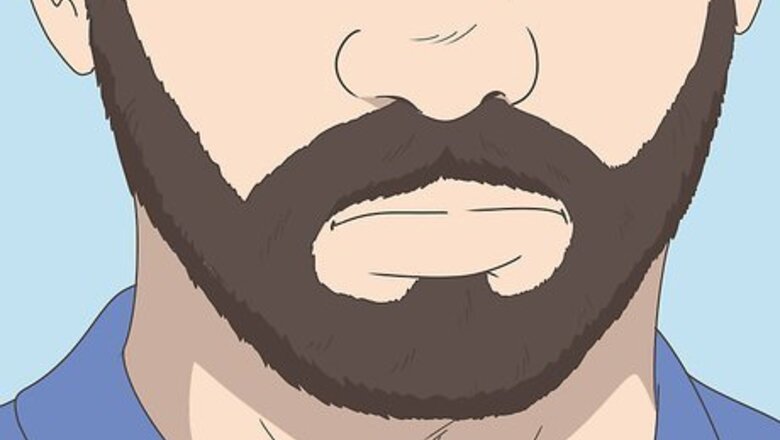
views
Trimming and Shaping
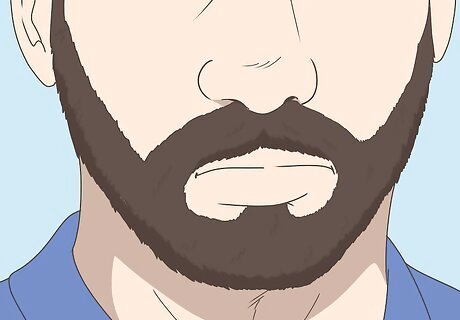
Grow your beard out for at least 2 weeks to let it fill in. Part of the reason your beard may look patchy is that different hairs grow at different rates and some are thicker than others. Hang in there with the patchiness for at least a couple of weeks or maybe even a month to allow some of the shorter hairs to catch up to the longer ones. If you realize that your beard doesn’t look as patchy anymore after a few weeks and you like how it looks, feel free to keep growing it out! Maybe the problem was that you just never gave it a chance to fill in. Note that all the steps in this method are meant to be done consecutively in a single shaving session.
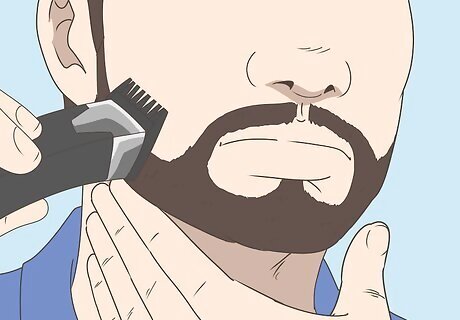
Trim your beard to a short, even length with a number 3 guide or shorter. Get in front of a mirror and clip a guide onto your beard trimmer, or select the trim level by rotating the guide selection wheel on the handle. Run the trimmer all over your beard, from different angles and always going against the grain, until it’s an even length. Take your time here and really hit that beard of yours from all the angles to make sure you’re trimming every single hair. The key to making it look less patchy is to get all the hairs to the same length.
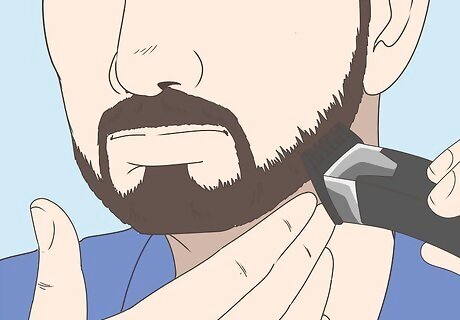
Shave your beard again with a lower guide if it still looks patchy. Take a few good looks at yourself in the mirror, rotating your head to see your beard from all angles. Put a shorter guide on your trimmer, or select a lower number on the guide selection wheel, and trim your beard again if it’s still too patchy for your tastes. For example, if you started with a 3 and that didn’t shorten and even out your beard enough for you, move down to a 2 and try again. You can keep going down to shorter guides and repeating the process until you’re happy with the length and evenness of your beard.
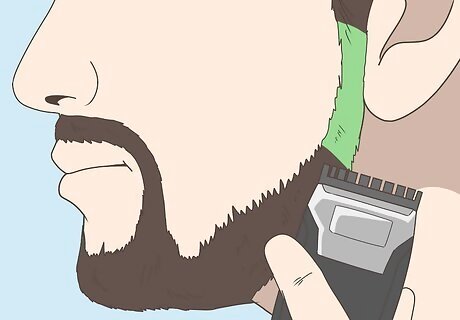
Tidy up your sideburns by trimming horizontal lines at the back of your jaw. Remove the guide from your beard trimmer or select the precision setting on it. Pull the skin of one of your cheeks forward to see the back of your sideburn, then shave off all the hair that goes past the natural horizontal line the sideburn grows in. Repeat this for the other side. This helps your sideburns blend smoothly into your facial hair and helps create a sharp border around your face to make your beard look more neat and tidy.
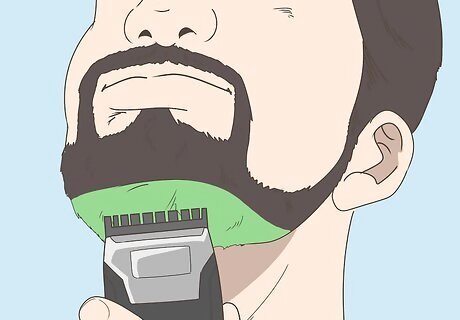
Clean up your neck and chin by shaving underneath your jawline. Lift your chin up at about a 45-degree angle, so you can see all the hair underneath your chin. Follow the natural line of your facial hair along the bottom of your jawline with the blades of the trimmer to create a nice clean line. Shave off all the excess hair below the line. Patchy facial hair often occurs on the neck and below the jaw, so getting rid of all this extra hair and creating a sharp outline along your jaw helps get rid of these unnecessary patches and makes it look clean and well-maintained.
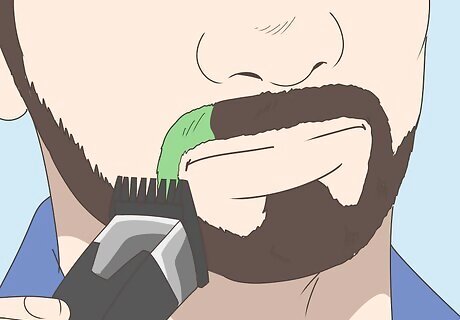
Shave a neat line from your sideburns to the corners of your mouth. Turn your face slightly to one side, so you can see the whole side of your face. Start at the sideburn and use the corner of your beard trimmer to trim all the stray hairs off your cheek. Move the blades of the trimmer along your cheek to the corner of your mouth to make a sharp line. Repeat this for the other side. The line can either be straight or curved, depending on the look you prefer and your aptitude with your beard trimmer. If the facial hair on your cheeks still looks too patchy for your taste after shaving this line, you can trim down a bit further than the corner of your mouth. Just be careful not to shave too deep and give the beard an unnatural shape.
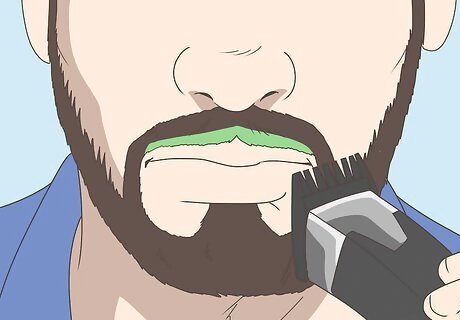
Shape the top and bottom of your mustache with your beard trimmer. Trim along the bottom of your mustache, following the top line of your upper lip, to get rid of any hairs encroaching towards your mouth. Shave off any stray hairs above your mustache and to its sides to finish shaping it. Tuck your upper lip down to make it easier to shave along the top part of your mustache.
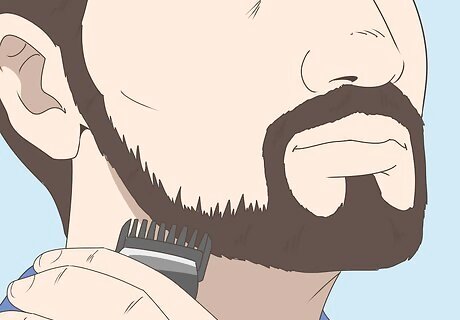
Repeat this process every couple of days to keep your beard neatly trimmed. Go back over your whole beard with whatever trimming guide works best for you. Shave sharp lines along your sideburns, cheeks, jawline, and mustache to keep it looking groomed and fresh. Remember you can always grow your beard out for 2 weeks or longer if you get sick of shaving it and want to see how well it grows in. Just be prepared for some awkward in-between patchiness while it fills in!
Styling and Disguising
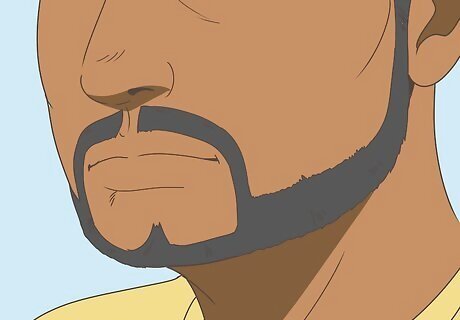
Shave your beard into styles that have clean, tidy lines. Any beard style that has sharp borders, especially along your jawline, cheekbones, nose, lips, and sideburns, works well for patchy beards. The sharp lines help disguise the patchiness and make your beard appear more clean-cut and professional. Both long and short beard styles can have clean borders, so you can experiment with the length of your beard to find what you like best.
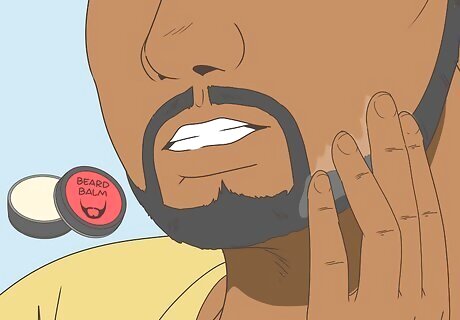
Apply beard balm to your beard daily to style and condition it. Work a natural beard balm into your facial hair with your fingertips when you’re getting ready for the day. This helps moisturize the hair and your skin to keep your beard looking healthy and shiny. Look for beard balms that contain natural ingredients like beeswax and shea butter.
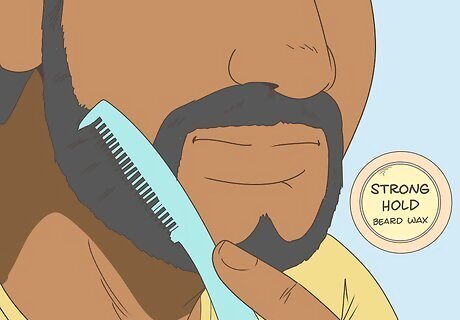
Comb longer hairs over patches with beard wax for longer beards. Look for beard waxes that say “strong hold.” Apply some of the wax to your beard with your fingertips and gently brush longer facial hairs over shorter areas with your fingers or a beard brush or comb to disguise patches. Strong hold beard waxes contain natural waxes and resins like beeswax and pine resin that work to hold your facial hairs in place all day.
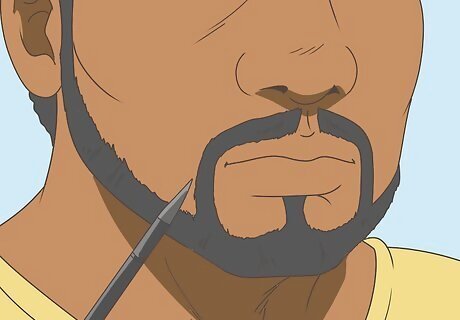
Shade in small patches that won’t grow in with an eyebrow pencil. Choose a color that’s as close to your natural facial hair color as possible. Gently rub the color onto your skin where those stubborn facial hairs just won’t grow. Rub the color on with the side of the pencil to get light, even coverage. Note that the eyebrow makeup will rub off on your pillow at night, so wash it off before bed and reapply it each day. If you’re unsure about doing this yourself, ask a friend or family member who has experience with makeup to do it for you the first time and teach you how.



















Comments
0 comment